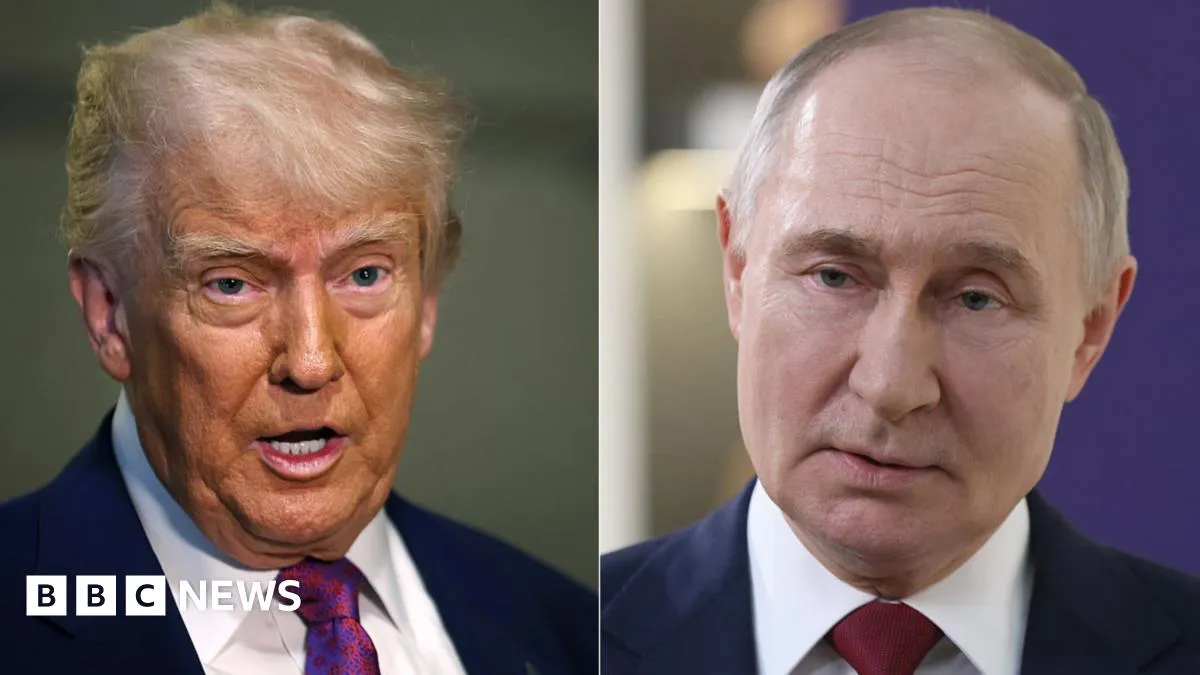
Russia's Response to Trump: A Polite Standoff
In a recent development, Russia's reaction to former President Donald Trump's characterization of Vladimir Putin as "absolutely CRAZY" has been notably polite—a stark contrast to the usual rhetoric seen from Moscow. This measured response indicates Russia's intention to avoid provoking the US president, particularly given the Kremlin's historical gains from Trump's unpredictable rhetoric and actions.
A key reason behind this diplomatic strategy may be to maintain Trump's interest in engaging with Putin, especially as Russia continues its aggressive military operations against Ukraine. The Kremlin appears concerned that if Trump follows through on his threats to impose new sanctions, it could significantly impact their ongoing military strategy. While Moscow has not hesitated to deride Ukrainian President Volodymyr Zelensky, labeling him a "clown" and a "loser," it is treading carefully when addressing the notoriously volatile US leader.
Amidst these tensions, Andriy Yermak, a senior aide to President Zelensky, has accused Russia of stalling critical ceasefire discussions. In a post on social media platform X, Yermak emphasized that Moscow is currently wasting time by failing to provide concrete proposals. He argued that the only way to expedite Russia's engagement in peace talks is through increased sanctions and military support for Ukraine.
Last week, Trump and Putin engaged in a two-hour phone call that was geared towards negotiating a US-proposed ceasefire. Trump expressed optimism about the conversation, stating that both Russia and Ukraine would begin negotiations for a ceasefire and an end to the ongoing war. While Ukraine has publicly endorsed a 30-day ceasefire, Putin's response has been more ambiguous, focusing instead on collaborating with Ukraine to draft a memorandum for potential peace.
In a robust response to a recent record drone attack on Ukraine, President Zelensky criticized the global community for its insufficient pressure on Putin. He noted in a social media post that the scale of these attacks reflects a troubling sense of impunity felt by Russia. Zelensky called for a more forceful approach against Putin, advocating for sustained military pressure and heightened sanctions to curb Russia's aggressive actions.
Amid these developments, Trump's criticism of Zelensky for calling for increased sanctions has raised eyebrows. Despite their disagreements, Zelensky must navigate this complex relationship with Trump carefully, as he continues to rely on American military aid to bolster Ukraine's defenses against the ongoing Russian barrage.
According to General Oleh Ivashchenko, head of Ukraine's foreign intelligence service, Russia remains steadfast in its goal of achieving "full control" over several contested regions in Ukraine, including Donetsk, Luhansk, Zaporihzhia, and Kherson. However, he cautioned that the Kremlin is facing significant challenges as its military resources become increasingly strained.
Ivashchenko highlighted that while Russia seeks to solidify its territorial claims, its forces are grappling with technological and economic exhaustion. He suggested that the Kremlin's participation in peace talks may be a tactical move to buy time and regroup rather than a genuine desire for resolution.
Donald Trump's relationship with Vladimir Putin has been contentious, marked by fluctuating levels of criticism and praise. Recently, Trump reiterated his belief that he has a good rapport with Putin, only to follow up with strong language condemning the Russian leader's actions. This duality in Trump's stance reflects the complexities of international diplomacy and the challenges faced by Ukraine as it seeks to navigate its relationship with powerful allies.
In his recent remarks, Trump pointed out that if Russia continues to delay in ceasefire negotiations, he would not hesitate to impose further sanctions on the country. This statement aligns with sentiments in Kyiv, where Ukrainian officials believe that stronger measures are necessary to effectively counter Russia's military aggression.
Vladimir Putin's approach to Ukraine has been characterized by a long history of aggressive military actions that date back over a decade. From the annexation of Crimea to the recent full-scale invasion, Russia's disregard for international norms has resulted in significant loss of life and widespread destruction within Ukraine.
As the conflict continues, it is clear that Putin’s ambitions extend beyond mere territorial gains; they reflect a broader desire to reassert Russian influence in the region. The international community's response, particularly from the US, remains crucial in determining the trajectory of this ongoing conflict.
The unfolding situation between Russia, Ukraine, and the United States continues to evolve, with each party navigating a complex web of diplomacy and military strategy. As Ukraine calls for more robust measures against Russia and the US grapples with its foreign policy approach, the stakes remain high for all involved. The future of peace talks, military support, and international sanctions will play a pivotal role in shaping the outcome of this conflict.